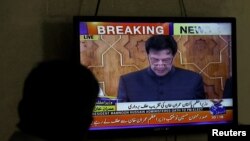Pakistan's newly elected Prime Minister Imran Khan, in his maiden speech to the nation Sunday night, promised wide-ranging reforms to combat corruption and cut government expenditures to tackle a crisis-ridden national economy.
The 65-year-old cricketer-turned-political leader spoke a day after taking the oath of office and pledged his Pakistan Tehreek-i-Insaf (PTI)-led coalition government will adopt austerity measures to ease strains on the economy and tackle foreign debt of about $95 billion.
"It is shameful that the prime minister house has 524 staff. It has 80 vehicles, 33 of them are bullet-proof vehicles. There are helicopters and airplanes," Khan lamented.
Khan said he plans to retain only a two-member staff and two cars while the rest of the vehicles will be auctioned off and the money raised deposited into the state treasury. He said he will use a small house inside the palatial prime ministerial residence in Islamabad and the rest will be dedicated for building a "world-class research university."
The radical administrative and economic reforms, Khan said, are aimed at improving the system of governance and turning the country of more than 200 million into an "Islamic welfare state (based) on the principles of justice and equality." Through this system, poverty-stricken families will have access to better education, health and other social services, he said.
"Our children are malnourished; stunted growth does not even allow their brains to develop properly. This is 45 percent of the children of Pakistan," Khan said, quoting a United Nations report. He added that more than 22 million Pakistani children are not enrolled in school.
He urged Pakistanis abroad to deposit their savings in the country's banks to help improve critically low foreign exchange reserves. He also said, due to a flawed and corruption-ridden tax collection system, fewer than 1 million people out of 200 million pay taxes.
Khan's inaugural speech was radical in its reframing of the role of government as "a vehicle for human development and a servant of justice," Arif Rafiq, a non-resident fellow at Washington's Middle East Institute, said.
"Combating wasteful government spending and corruption could encourage more income tax compliance, as the middle class may come to view government spending as being redirected in the favor of the common man," Rafiq said.
But such actions must be paired with institutional reforms, including empowering the tax collecting Federal Board of Revenue to act against tax evaders, Rafiq added.
In his speech Sunday, Khan only briefly spoke about his foreign policy and vowed to maintain "good relations" with all neighboring countries, saying peace is a prerequisite for Pakistan to progress and develop.
Khan's PTI party defeated its main rival, the Pakistan Muslim League of former Prime Minister Nawaz Sharif, in the July 25 elections. Sharif was disqualified from holding a public office in in 2017 for concealing foreign assets. An anti-corruption court last month sentenced him to a 10-year jail term.
Khan and his party had been on the forefront in street agitation and legal battles that led to Sharif's dismissal from power and subsequent conviction.
The PTI could not win the 2013 national elections, but it was able to form and lead a coalition government in the northwestern Khyber Pakthunkhwa (KP) province, where it introduced unprecedented police and social sector reforms, including health insurance for more than 1.5 million families living below the poverty line.
Khan also personally supervised a massive reforestation campaign to fight climate change, successfully planting more than 1 billion trees across KP.
The PTI's performance is credited for the party's landslide victory in KP's provincial assembly election, also held July 25.
Pakistan's Khan Pledges Reforms to Counter Corruption, Poverty
- By Ayaz Gul

ISLAMABAD —



